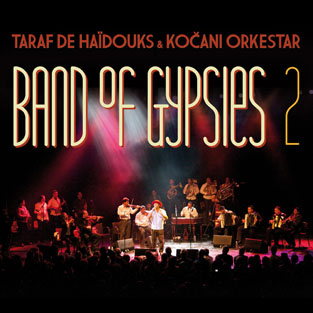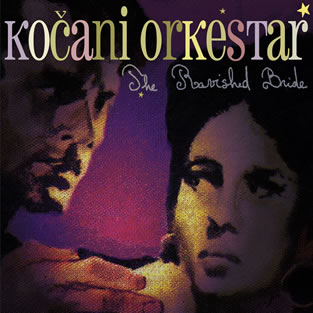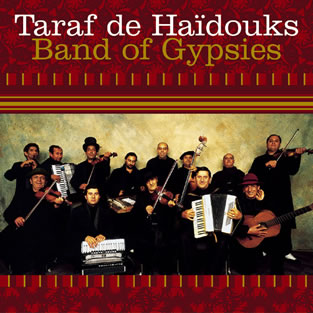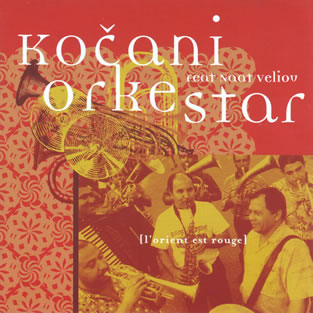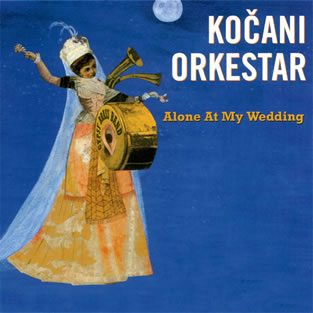
After their adventures alongside the Taraf de Haïdouks (on the acclaimed and awarded "Band Of Gypsies" album), the mighty Macedonian brass band continued to broaden their scope in this exciting album devoted to Gypsy wedding music.
Music
With their expanded line-up, mighty Macedonian brass band Koçani Orkestar are wilder than ever, getting the entire audience up on their feet & dancing at every concert. Their music is still based on Gypsy tunes from various parts of the Balkans and on Turkish/Bulgarian rhythms, with a sprinkle of Latin flavour... but this album is particularly devoted to the repertoire played by Gypsy bands during wedding celebrations in Macedonia. This enables the Koçani Orkestar to transcend the strict boundaries of the brass band genre : half of the tracks showcase the vocal talents of their two new singers (charismatic, young Aljur Azizov and accordionist Zlate Nikolov), and there are several small ensemble pieces featuring instruments such as darbuka, banjo and clarinet. The band's popular trademark thundering style is present as ever, with its powerful rhythm section (drummer + four tubas) which rocks like a mutant Balkan funk band, and its wailing, passionate soloists (Ismail Saliev on sax, Turan Gaberov on trumpet and Deladin Demirov on clarinet).
Wedding
In Macedonia they usually involve the participation of two different types of bands. The marching brass band goes all around the village to pick up the main protagonists from their respective homes, and escort them to the house where the (generally extravagant) festivities are to take place. Once the procession has reached its destination, the brass band keeps playing while the guests arrive and start to unpack and present their gifts to the young couple: jewels, clothes, food, kitchen utensils etc. Then everyone settles around the banquet table for a long, festive meal. This is when the second band comes in, generally consisting of a percussionist, a horn player (trumpet, sax or clarinet), a banjo (played somewhat like an oriental oud, and often replaced by a synthesizer nowadays) and a singer. Known so far as a marching brass band, the Koçani Orkestar have now also drawn on the repertoire played by these "banquet combos", sometimes adapting it for their expanded brass band line-up, and sometimes venturing into the intricate interplay typical of these small ensembles.
River
Weddings generally last three days and three nights. There's a tradition in the village of Koçani: after having danced, sung, drunk and played music throughout the first night, the entire party walks out at dawn, pays a short visit to the mufti at the mosk (a good deal of the population -including the Gypsies- are Moslems in this area which used to be part of the Ottoman empire), after which everyone jumps into the river.
Shirt
On the second day, everyone gathers around the bride's house. Women are allowed to drink alcohol, so they do drink a lot. Men paint patterns on their faces with lipstick and tear each other's shirts. The torn shirts are then arranged into a big pile which is set on fire. The band plays, everybody dance.
Party
"Bayram" is a word of Turkish origin which designates the celebrations at the end of the Ramadan. Bayram then came to mean "celebrations" in general (from wedding celebrations to any more prosaic type of "partying"). The song title "Bayram Sekjeri" refers to the assorted sugary confections which are abundantly consumed on these occasions.
Language
"Alone At My Wedding" is true to the multicultural, multilingual nature of the Balkans, as it contains song lyrics in Macedonian (Slavic), in Turkish and in Rom (Gypsy).
The Koçani Orkestar comes from the city of Koçani, in the F.Y. Republic Of Macedonia. It is the most famous exponent of the style described in their region as Romska Orientalna Musika ('Oriental Gypsy Band'). Oriental brass bands are a Gypsy specialty throughout the Balkan region, from Serbia to Macedonia. These brass bands were created in the 19th century, in imitation of the military brass bands of the Turkish janissaries which had replaced the traditional ensembles based on oboes and drums.
Line-up
Ismael Saliev : alto sax, vocals
Ajlur Azizov : vocals
Deladin Demirov : clarinet
Zlate Nikolov : accordion, vocals
Turan Gaberov : trumpet
Sukri Kadrievi : trumpet
Saban Jasarov : tapan
Redzai Durmisev : tuba
Mendu Saliev : tuba
Esat Saliev : tuba
Ismail Jasarov : bass tuba
Guests
Rakip Kazimov : djumbus, vocals
Zivko Ognjavov : darbuka
Nusret Bajranov : trumpet
Aurel Ionitsa : violin
Stephane Karo : trumpet








